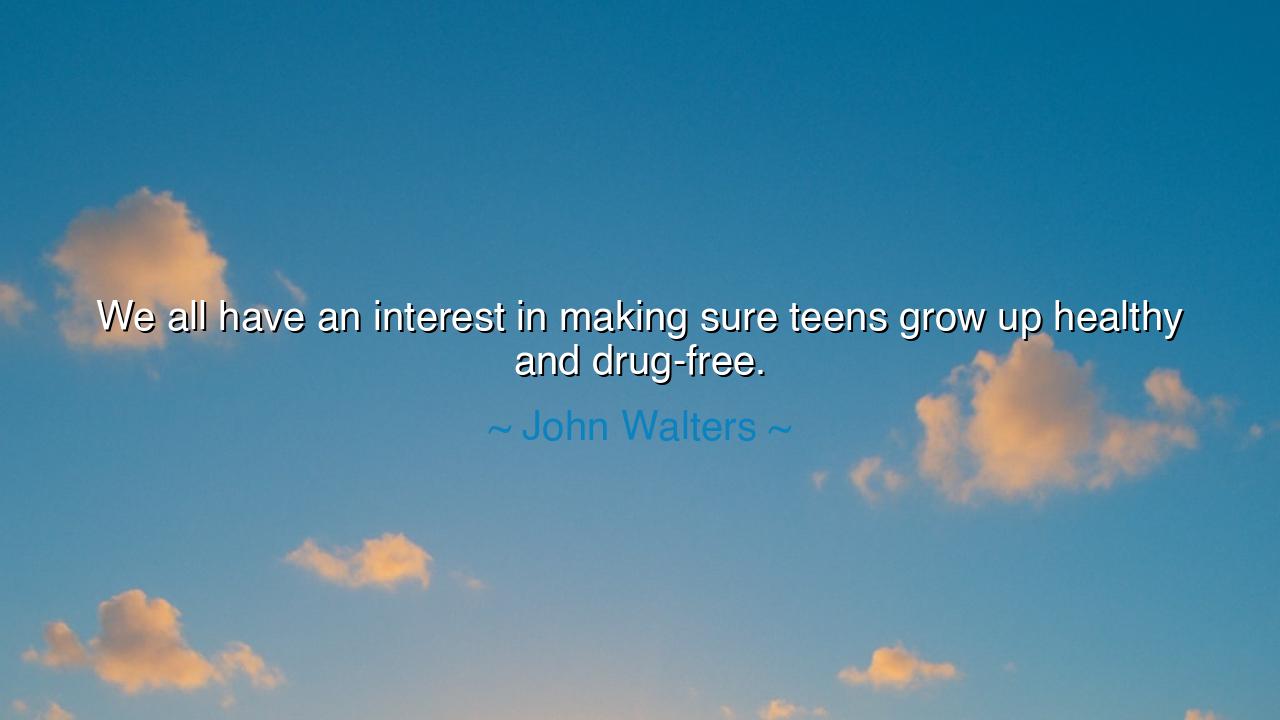
We all have an interest in making sure teens grow up healthy and






Hearken, O children of the ages, to the solemn words of John Walters, who speaks of the sacred duty that binds all members of society: “We all have an interest in making sure teens grow up healthy and drug-free.” In this reflection, we discern an eternal truth: the youth of today are the foundation of tomorrow, and their well-being is a responsibility not solely of parents, but of the community, the elders, and the guardians of wisdom. To safeguard their bodies, minds, and spirits is to invest in the endurance and virtue of generations yet unborn.
Since the dawn of human civilization, elders have recognized the fragility and potential of youth. In ancient Sparta, boys were rigorously trained in body and mind, guided and protected to ensure their growth into capable, resilient citizens. Walters’ words echo this ancient vigilance: the health and moral integrity of adolescents is not a private concern, but a collective imperative, for the future of society rests upon the choices, habits, and nurture of its young.
Consider the story of Florence Nightingale, who, in her youth, devoted herself to learning, observation, and care for the sick. Her discipline, vigilance, and commitment to health later revolutionized the field of nursing, saving countless lives. Similarly, when a society invests in the health and moral guidance of its teens, it ensures that the adults they become will be strong, wise, and capable of contributing to the flourishing of all. The vigilance of elders, guardians, and communities is the bedrock upon which such futures are built.
Walters’ reflection also illuminates the perils that threaten youth: the allure of drugs, the seductions of destructive habits, and the vulnerabilities of untested minds. To allow such dangers to go unchecked is to imperil not only the individual but the collective fabric of society. Ancient philosophers recognized this principle: when the young were corrupted or led astray, the strength and virtue of the polis faltered. Protecting youth is not merely an act of care—it is a strategic, moral, and civic imperative.
The lesson extends beyond mere admonition: cultivating healthy and drug-free adolescence requires education, guidance, and example. By teaching young people the consequences of destructive behaviors, providing support and alternatives, and modeling virtue and self-discipline, societies create conditions in which youth can flourish. Walters reminds us that vigilance, mentorship, and investment in well-being are not burdens, but acts of profound foresight and compassion.
Practical guidance emerges from this wisdom. Encourage open dialogue with adolescents, provide access to knowledge and support, and create communities that prioritize health, safety, and moral guidance. Engage in mentorship, modeling resilience and virtue, and ensure that young people are equipped with both understanding and opportunity to make wise choices. The investment in youth is an investment in the strength, morality, and prosperity of society itself.
Walters’ insight also underscores the interconnectedness of communal responsibility. It is not the sole duty of parents or guardians; teachers, leaders, neighbors, and peers all share a stake in the cultivation of healthy, drug-free youth. Just as ancient communities trained their young collectively in ritual, combat, and learning, so must modern society embrace shared responsibility to ensure that adolescents grow with guidance, discipline, and opportunity.
Thus, heed the eternal teaching of John Walters: the health, virtue, and moral integrity of youth are treasures to be safeguarded by all. By fostering environments that protect, instruct, and support adolescents, we secure not only their well-being but the enduring prosperity, wisdom, and strength of generations yet to come. To invest in the young is to invest in the eternal continuity of human virtue and flourishing.






AAdministratorAdministrator
Welcome, honored guests. Please leave a comment, we will respond soon